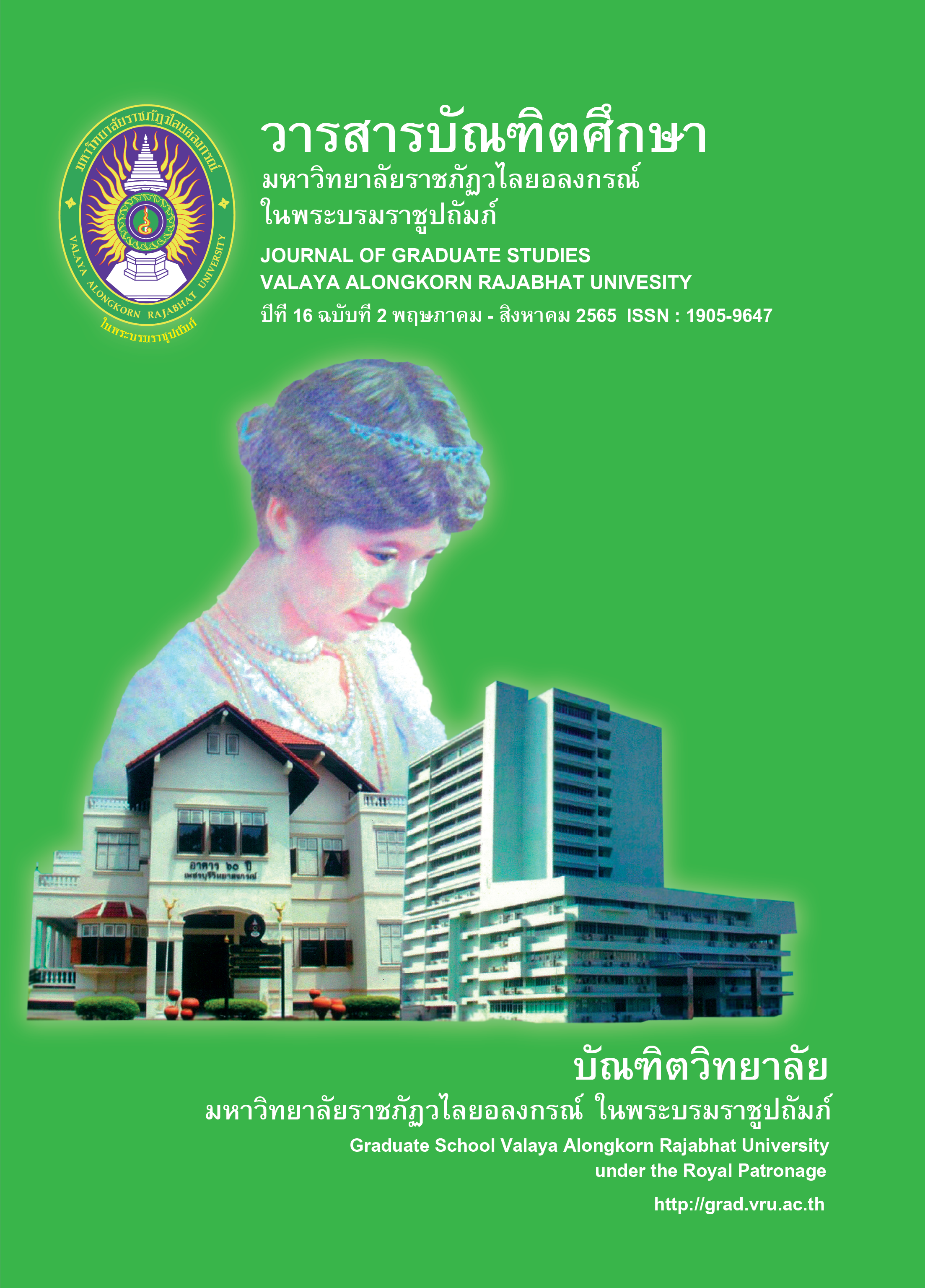THE DEVELOPMENT OF TRANSVERSAL COMPETENCIES BY SOCIO SCIENTIFIC ISSUE-BASED INSTRUCTION
Main Article Content
Abstract
Transversal competencies (TVC) are essential competencies for the well-being of the next generations of world citizen aimed in 2030 as a goal determined by Organization for Economic Cooperation and Development (OECD). The development of TVC is important for preparing students to the challenging future. Socio-scientific issue - based Instruction (SSI) is the one of approaches that could developed reasoning skills, critical thinking, and argumentation which enhance TVC in the components of Critical and Innovative Thinking, Interpersonal skills, Global Citizenship and Media and Information Literacy. This article aims to present TVC framework, the characteristics of SSI, SSI’s instructional models, some examples of SSI instruction and review the effect of SSI on TVC.
Article Details

This work is licensed under a Creative Commons Attribution-NonCommercial-NoDerivatives 4.0 International License.
บทความทุกเรื่องได้รับการตรวจความถูกต้องทางวิชาการโดยผู้ทรงคุณวุฒิ ทรรศนะและข้อคิดเห็นในบทความ Journal of Global of Perspectives in Humanities and Social Sciences (J-GPHSS) มิใช่เป็นทรรศนะและความคิดของผู้จัดทำจึงมิใช่ความรับผิดชอบของบัณฑิตวิทยาลัย มหาวิทยาลัยราชภัฏวไลยอลงกรณ์ ในพระบรมราชูปถัมภ์ กองบรรณาธิการไม่สงวนสิทธิ์การคัดลอก แต่ให้อ้างอิงแหล่งที่มา
References
Dawson, V., & Carson, K. (2020). Introducing argumentation about climate change socioscientific issues in a disadvantaged school. Research in Science Education. 50(3), 863-883.
Dawson, V., & Venville, G. (2013). Introducing high school biology students to argumentation about socioscientific issues. Canadian Journal of Science, Mathematics and Technology Education. 13(4), 356-372.
Foong, C. C., & Daniel, E. G. (2013). Students’ argumentation skills across two socio-scientific issues in a Confucian classroom: Is transfer possible?. International Journal of Science Education. 35(14), 2331-2355.
Herman, B. C., Zeidler, D. L., & Newton, M. (2018). Students’ emotive reasoning through place-based environmental socioscientific issues. Research in Science Education. 1-29.
Johnstone, S. M. & Soares, L. (2014). Principle for Developing Competency-based Education Programs. Journal of CHANGE, (March/April), 12-18.
Karpudewan, M., & Roth, W. M. (2018). Changes in primary students’ informal reasoning during an environment-related curriculum on socio-scientific issues. International Journal of Science and Mathematics Education. 16(3), 401-419.
Keefer, M. W. (2003). Moral reasoning and case-based approaches to ethical instruction in science. In D. L. Zeidler (Ed.), the role of moral reasoning on socioscientific issues and discourse in science education. Dordrecht: Kluwer Academic Press.
Leitão, S. (2000). The potential of argument in knowledge building. Human Development. 43(6), 332-360.
Ministry of Education. (2017). tūa chī wat læ sāra kānrīanrū kǣn klāng klum sāra kānrīanrū witthayāsāt (chabap prapprung Phō̜.Sō̜. sō̜ngphanhārō̜ihoksip) tām laksūt kǣn klāng kānsưksā naphư̄n thān Phutthasakkarāt sō̜ngphanhārō̜ihāsipʻet [Criteria and core strand, science department (revised 2017), core curriculum 2008]. Bangkok: Agricultural cooperative printing demonstrations of Thai co., Ltd.
Nuangchalerm, P. (2008). kān rīan kānsō̜n witthayāsāt tām nǣokhit Socioscientific [Scientific learning and scientific instruction according to socioscientific]. Journal of Education, Mahasarakham University. 2(3): 99-105.
ONEC. (2019). krō̜p samatthana lak phū rīan radap kānsưksā naphư̄n thān læ radap prathomsưksā tō̜n ton (Por nưng - sām) [Core competencies framework for fundamental education level and primary school (grade 1-3)]. Nonthaburi: 21 Century Co., Ltd.
Panjan, S., & Kijkuakul, S., Nakkuntod, M. (2019). nǣothāng kānčhatkān rīanrū dōi chai praden thāng sangkhom thī kīeokhō̜ng kap witthayāsāt thī songsœ̄m kān plīanplǣng manō that læ čhētakhati tō̜ witthayāsāt rư̄ang rabop munwīan lư̄at læ rabop phūmkhumkan khō̜ng nakrīan chan matthayommasưksā pī thī sī [Using socio-scientific issue (SSI) to promote conceptual change and attitude towards science of grade 10 students on circulartory and immune system]. NRRU Community Research Journal. 13(3), 212-224.
Pedretti, E. (2003). Teaching science, technology, society and environment (STSE) education: Preser- vice teachers’ philosophical and pedagogical landscapes. In D. L. Zeidler (Ed.), the role of moral reasoning on socioscientific issues and discourse in science education. Dordrecht: Kluwer Academic Press.
Pitiporntapin, P. (2015). kānčhatkān rīanrū witthayāsāt kap sangkhom hǣng satawat thī yīsip ʻet [Science and social instruction for 21stCentury]. Samut Prakan: Neva Education.
Pratiwi, Y. N., Rahayu, S., & Fajaroh, F. (2016). Socioscientific issues (SSI) in reaction rates topic and its effect on the critical thinking skills of high school students. Journal Pendidikan IPA Indonesia. 5(2), 164-170.
Sadler, T. D. (2011). Socio-scientific Issues in the classroom, teaching, learning and research. Contemporary Trends and Issues in Science Education Volume 39. New York: Springer.
Sadler, T. D. (2004). Informal reasoning regarding socio-scientific issues: A critical review of research. Journal of Research in Science Teaching. 41, 513–536.
Sadler, T. D., Barab, S. A., & Scott, B. (2007). What do students gain by engaging in socioscientific inquiry? Research in Science Education. 37(4), 371-391.
Solbes, J., Torres, N., & Traver, M. (2018, June). Use of socio-scientific issues in order to improve critical thinking competences. In Asia-Pacific Forum on Science Learning and Teaching (pp. 1-23). The Education University of Hong Kong, Department of Science and Environmental Studies.
Torres, N. Y., & Solbes, J. (2016). Contributions of intervention teaching using socioscientific issues to develop critical thinking. Enseñanza de las Ciencias. 34(2), 43-65.
UNESCO. (2019). Assessment of transversal competencies: current tools in the Asian Region. France: United Nations Educational, Scientific and Cultural Organization.
Wang, H. H., Chen, H. T., Lin, H. S., Huang, Y. N., & Hong, Z. R. (2017). Longitudinal study of a cooperation-driven, socio-scientific issue intervention on promoting students’ critical thinking and self-regulation in learning science. International Journal of Science Education. 39(15), 2002-2026.
Wu, Y. T., & Tsai, C. C. (2007). High school students’ informal reasoning on a socio‐scientific issue: Qualitative and quantitative analyses. International Journal of Science Education. 29(9), 1163-1187.
Yeampayung, P., & Sawangmek, S. (2021). kānčhatkān rīanrū dūai praden thāng sangkhom thī kīeokhō̜ng kap witthayāsāt phanūak kān sathō̜n khit phān khrư̄akhāi sangkhom ʻō̜nlai phư̄a songsœ̄m khwāmsāmāt nai kāntatsinčhai praden thāng sangkhom thī kīeokhō̜ng kap witthayāsāt rư̄ang manut kap singwǣtlō̜m samrap nakrīan chan matthayommasưksā pī thī hok [Study of socioscientific issue approach with reflection of using social media to enhance socioscientific decision making about human and environment for 12th grade students.] Journal of Education Naresuan University, 23(1), 237-251.
Zeidler, D. L., & Nichols, B. H. (2009). Socioscientific issues: Theory and practice. Journal of Elementary Science Education. 21(2), 49.


